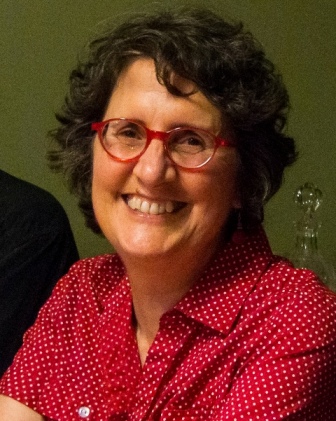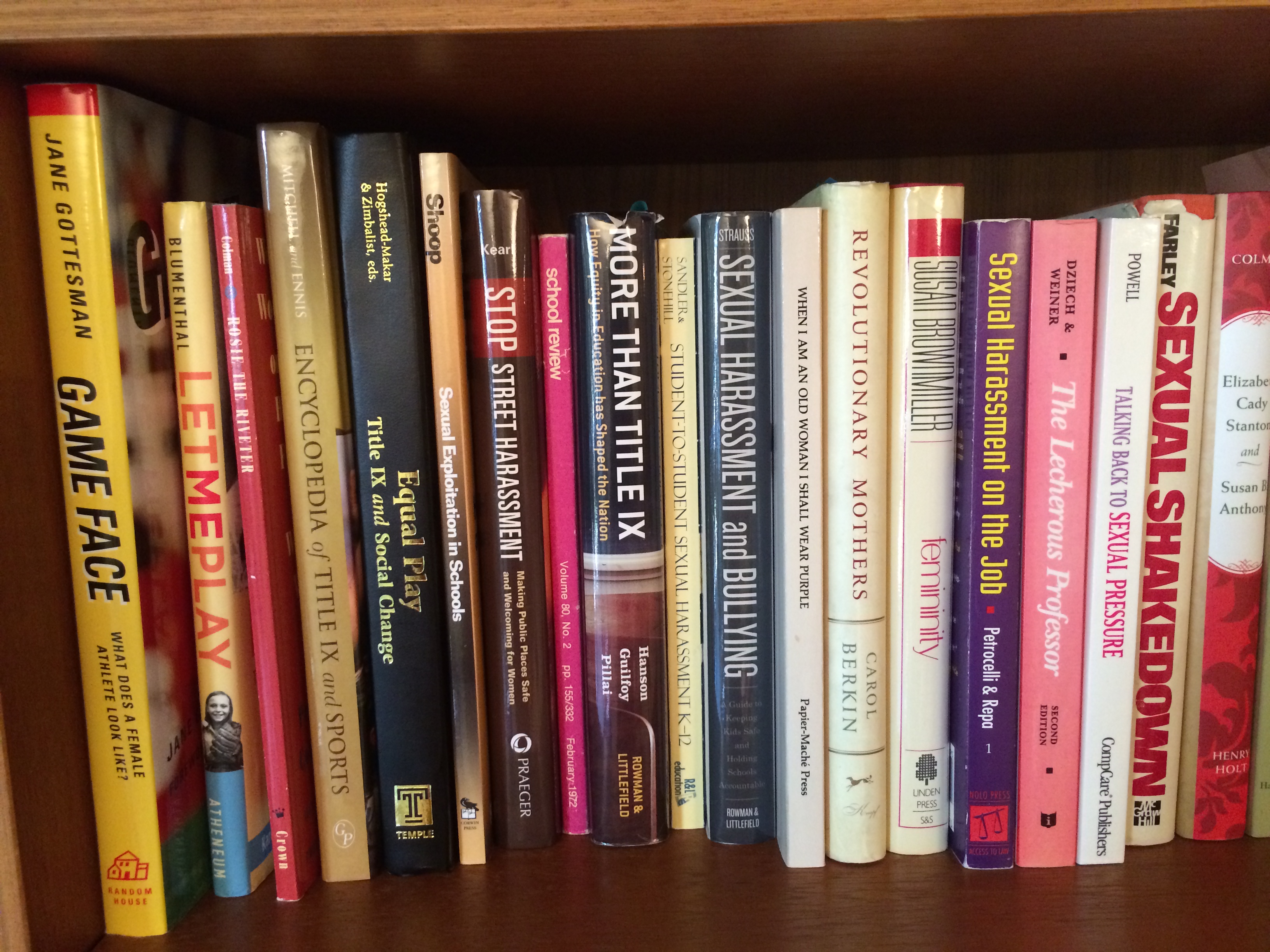My Title IX reading list (or what I did this summer)
Current news articles and analyses provide helpful nuggets of background related to Title IX, such as a New York Times Magazine article on The Return of the Sex Wars. But to sample the bigger buffet of Title IX history from the past 50 years, I’ve been devouring books and films, digging into research libraries, and savoring original documents generously sent me by the people I’ve been interviewing.
Bernice Sandler told me that she once set a goal of owning every book about equality for women, which might have been possible decades ago, but she soon found that the second wave of feminism generated so many books that she’d never catch up. My goal is to read or own every book about Title IX and enough books about women’s history to understand the bigger picture.
If you know of books, films, or documents that I shouldn’t miss, please do let me know. Here’s what I’ve seen/read or have lined up so far.
First, I want to thank the wonderful staff at the Schlesinger Library on the History of Women in America, at Harvard University, for the two weeks I spent there this summer (and three days last November) digging around the papers of the Women’s Equity Action League (WEAL), the National Organization for Women, Bernice Sandler, and others. I’ll be back! A separate visit to the Library of Congress will be followed by repeats, and I hope to visit research libraries with the papers of Rep. Edith Green, Rep. Martha Griffiths, and Sen. Birch Bayh.
The best, most accurate history of Title IX that I’ve read so far is a short book for children and teens, Let Me Play: The Story of Title IX, the law that changed the future of girls in America, by Karen Blumenthal. I am impressed by a great chapter on Title IX in Susan Ware’s book Game, Set, Match: Billie Jean King and the Revolution in Women’s Sports. I also dug into A Place on the Team: The Triumph and Tragedy of Title IX by Welch Suggs, and More than Title IX: How Equity in Education has Shaped the Nation, by Katherine Hanson, Vivian Guilty, and Sarita Pillai.
On my shelf: Title IX, a legal history by Linda Jean Carpenter and R. Vivian Acosta; Equal Play: Title IX and Social Change, by Nancy Hogshead-Makar and Andrew Zimbalist, editors; Getting in the Game: Title IX and the Women’s Sports Revolution, by Deborah L. Brake, and Title IX: A Brief History with Documents, by Susan Ware. And I’m considering the new book by Ginny Gilder, Course Correction: A Story of Rowing and Resilience in the Wake of Title IX.
I’m also going to read all of the 1,200 pages of records from the first Congressional hearings on sex discrimination in education in 1970, available at the library. I’d love to have hard copies of the two-volume set, though, if anyone has a spare. Or, if you’re affiliated with an institution that has a partnership with the Hatha Trust Digital Library, perhaps you could download the pdf files of Part 1 and Part 2 and share them with me?
I enjoyed a memoir by Arvonne Fraser, a key WEAL leader during the early years of title IX, called She’s No Lady: Politics, Family, and International Feminism. Senator Birch Bayh authored the U.S. Senate’s version of Title IX, and to get a sense of him and his times from his late wife’s viewpoint I read her memoir Marvella: A Personal Journey, a tragic story not just because she died of breast cancer in 1979 but because of the sexism in her time that so constrained her career. I’m looking forward to reading Pauli Murray’s memoir Song in a Weary Throat: An American Pilgrimage, to learn from the life of this pioneering African-American feminist.
Title IX didn’t happen in a vacuum, so to put it in the context of the broader women’s movement I’ve read two books by Sara M. Evans: Tidal Wave: How Women Changed America at Century’s End, and Personal Politics: The Roots of Women’s Liberation in the Civil Rights Movement and the New Left. And since the civil rights movement so influenced the women’s movement, I also read Clay Risen’s The Bill of the Century: The Epic Battle for the Civil Rights Act and Jason Sokol’s All Eyes Are Upon Us: Race and Politics from Boston to Brooklyn. Those two didn’t have Title IX in them, of course, but they were good reads.
On my shelf: Ruth Rosen’s The World Split Open: How the Modern Women’s Movement Changed America; Susan Ware’s American Women’s History: A Very Short Introduction, and another book by Sara Evans, Born for Liberty: A History of Women in America.
The amazing Margaret Dunkle, who worked alongside Bernice Sandler and deftly chaired the National Coalition for Women and Girls in Education, has been kind enough to send me multiple helpful books and documents from the 1970s and 1980s that I’m working my way through, including the Coalition’s 1977 Sex Discrimination in Education: A Policy Handbook. Among other original documents, Mary Ann Millsap shared her 1988 dissertation, Advocates for Sex Equity in Federal Education Law: The National Coalition for Women and Girls in Education, and Betsy Salkind was kind enough to send me her 1986 thesis, “Can’t You Take a Joke?” A Study of Sexual Harassment Among Peers.
Books and papers haven’t been the only eye-brain candy, though. Besides frequently referring to the video (which you can find here on my blog) of the January 2015 luncheon of 11 foremothers of Title IX graciously organized by Margaret Dunkle, I’ve enjoyed several documentaries, including: Sporting Chance: The Lasting Legacy of Title IX; A Hero for Daisy, and Patsy Mink: Ahead of the Majority. Plus, I caught this year’s releases of The Hunting Ground about the current Title IX issue of sexual assaults on college campuses and of She’s Beautiful When She’s Angry on the beginnings of the women’s liberation movement in the late 1960s and early 1970s.
And since I may frame my book as a people’s history of Title IX, I’ve been re-reading Howard Zinn’s A People’s History of the United States, to be followed by Vicki L. Eaklor’s Queer America: A People’s GLBT History of the United States.
I’m finding that this project is a balancing act. As a journalist, my impulse is to focus on interviewing the wonderful people behind Title IX while I can, while they are available. But as an independent scholar, I’m learning good things in my self-designed crash course in women’s studies and Title IX that should help me ask better questions in those interviews, I think.
What do you think? If you have suggestions for books, documents, archives, or people that I should include, do tell.








